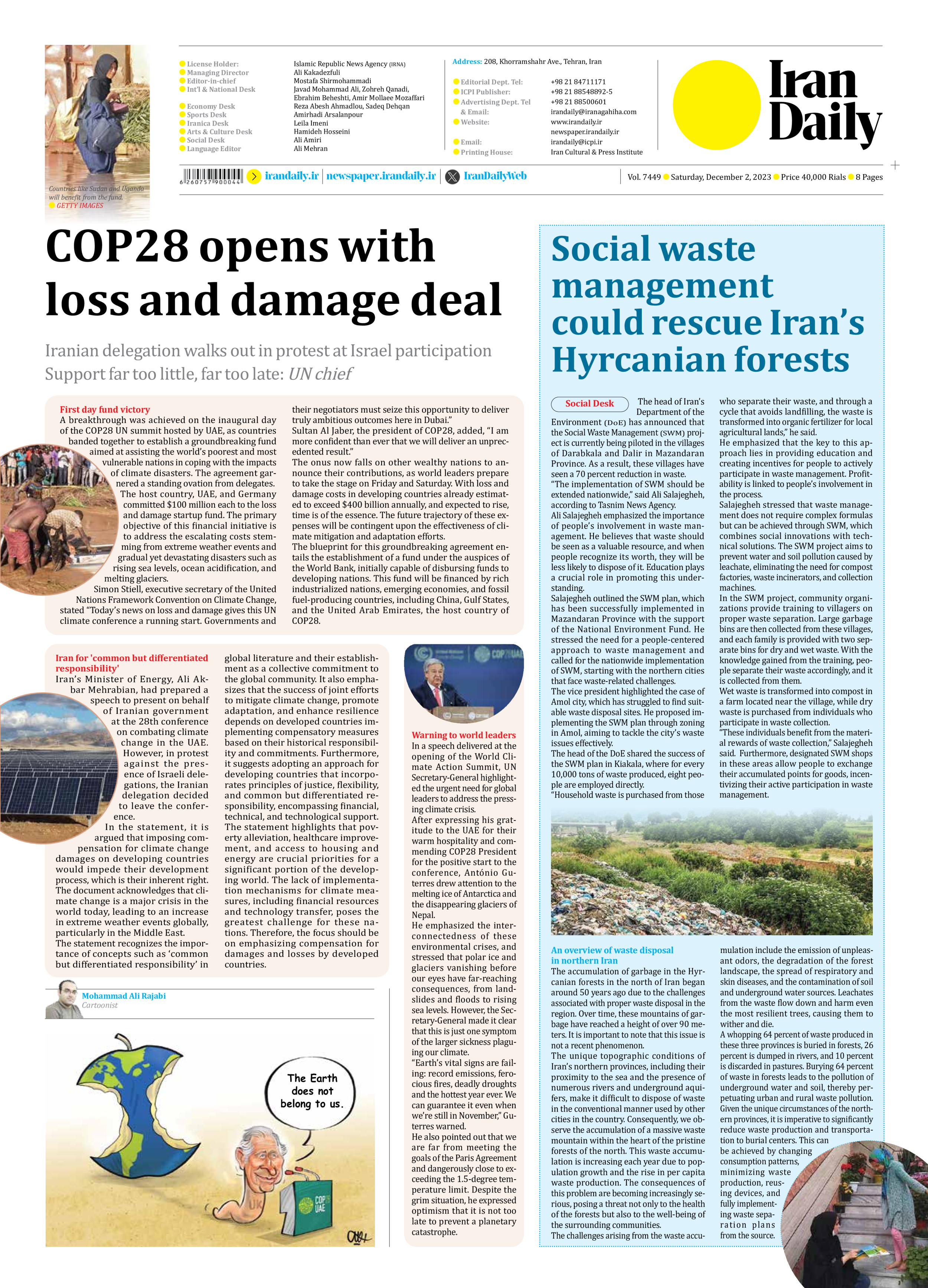
COP28 opens with loss and damage deal
Iranian delegation walks out in protest at Israel participation Support far too little, far too late: UN chief
First day fund victory
A breakthrough was achieved on the inaugural day of the COP28 UN summit hosted by UAE, as countries banded together to establish a groundbreaking fund aimed at assisting the world’s poorest and most vulnerable nations in coping with the impacts of climate disasters. The agreement garnered a standing ovation from delegates.
The host country, UAE, and Germany committed $100 million each to the loss and damage startup fund. The primary objective of this financial initiative is to address the escalating costs stemming from extreme weather events and gradual yet devastating disasters such as rising sea levels, ocean acidification, and melting glaciers.
Simon Stiell, executive secretary of the United Nations Framework Convention on Climate Change, stated “Today’s news on loss and damage gives this UN climate conference a running start. Governments and their negotiators must seize this opportunity to deliver truly ambitious outcomes here in Dubai.”
Sultan Al Jaber, the president of COP28, added, “I am more confident than ever that we will deliver an unprecedented result.”
The onus now falls on other wealthy nations to announce their contributions, as world leaders prepare to take the stage on Friday and Saturday. With loss and damage costs in developing countries already estimated to exceed $400 billion annually, and expected to rise, time is of the essence. The future trajectory of these expenses will be contingent upon the effectiveness of climate mitigation and adaptation efforts.
The blueprint for this groundbreaking agreement entails the establishment of a fund under the auspices of the World Bank, initially capable of disbursing funds to developing nations. This fund will be financed by rich industrialized nations, emerging economies, and fossil fuel-producing countries, including China, Gulf States, and the United Arab Emirates, the host country of
COP28.
Iran for 'common but differentiated
responsibility'
Iran’s Minister of Energy, Ali Akbar Mehrabian, had prepared a speech to present on behalf of Iranian government at the 28th conference on combating climate change in the UAE. However, in protest against the presence of Israeli delegations, the Iranian delegation decided to leave the conference.
In the statement, it is argued that imposing compensation for climate change damages on developing countries would impede their development process, which is their inherent right. The document acknowledges that climate change is a major crisis in the world today, leading to an increase in extreme weather events globally, particularly in the Middle East.
The statement recognizes the importance of concepts such as ‘common but differentiated responsibility’ in global literature and their establishment as a collective commitment to the global community. It also emphasizes that the success of joint efforts to mitigate climate change, promote adaptation, and enhance resilience depends on developed countries implementing compensatory measures based on their historical responsibility and commitments. Furthermore, it suggests adopting an approach for developing countries that incorporates principles of justice, flexibility, and common but differentiated responsibility, encompassing financial, technical, and technological support.
The statement highlights that poverty alleviation, healthcare improvement, and access to housing and energy are crucial priorities for a significant portion of the developing world. The lack of implementation mechanisms for climate measures, including financial resources and technology transfer, poses the greatest challenge for these nations. Therefore, the focus should be on emphasizing compensation for damages and losses by developed
countries.
Warning to world leaders
In a speech delivered at the opening of the World Climate Action Summit, UN Secretary-General highlighted the urgent need for global leaders to address the pressing climate crisis.
After expressing his gratitude to the UAE for their warm hospitality and commending COP28 President for the positive start to the conference, António Guterres drew attention to the melting ice of Antarctica and the disappearing glaciers of Nepal.
He emphasized the interconnectedness of these environmental crises, and stressed that polar ice and glaciers vanishing before our eyes have far-reaching consequences, from landslides and floods to rising sea levels. However, the Secretary-General made it clear that this is just one symptom of the larger sickness plaguing our climate.
“Earth’s vital signs are failing: record emissions, ferocious fires, deadly droughts and the hottest year ever. We can guarantee it even when we’re still in November,” Guterres warned.
He also pointed out that we are far from meeting the goals of the Paris Agreement and dangerously close to exceeding the 1.5-degree temperature limit. Despite the grim situation, he expressed optimism that it is not too late to prevent a planetary catastrophe.







